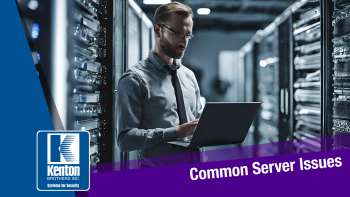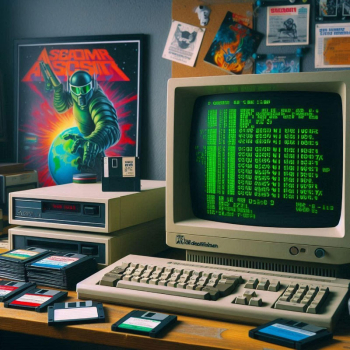Common Commercial Security Server Issues
By Neal Bellamy, IT Director at Kenton Brothers
 Although cloud-based systems are getting more popular, many security systems still have on-premise servers at their heart. Servers, like all electronics, can fail and will need to be replaced. Servers also need updating in many ways. Sometimes they can show signs of issues overnight, and sometimes more slowly over time. The overnight issues are easier to detect, but the slower failures can be harder to detect, so I thought I would share some things to look out for.
Although cloud-based systems are getting more popular, many security systems still have on-premise servers at their heart. Servers, like all electronics, can fail and will need to be replaced. Servers also need updating in many ways. Sometimes they can show signs of issues overnight, and sometimes more slowly over time. The overnight issues are easier to detect, but the slower failures can be harder to detect, so I thought I would share some things to look out for.
Video servers tend to be the most sensitive to component failure or being overloaded.
Video servers have the toughest job of all the security servers. They need to be able to connect to the cameras, pull the video stream off the network, process the video, and then possibly write it to a hard drive in near real-time. If any one of those processes struggles, the video may not be saved properly. At the same time, if cameras are being viewed, they need to be able to send the video to whoever is viewing them.
A sign that your video server needs help is when your video is “Jumpy”. Jumpy video is when the video appears to be choppy and does not play smoothly. Most video systems are recording at least 12 frames per second, so live and recorded video should appear to be smooth. It might not be as smooth as a movie or video game, but it should not have a very detectable jump between frames. Jumpiness is usually caused by an overwhelmed server, or some component, like a hard drive, has failed.
Another common issue is when logging into the security software becomes slower than usual. “Usual” depends on which software is being used, but it should be as fast as the day it was installed. Servers that turn themselves off or reboot themselves often, more than once a month, are also signs that they need help. If you sometimes can’t log in, but then can after waiting a while, the server might have just rebooted.
Sometimes it’s not because of a failure that your server needs attention, sometimes it’s just time.
 Server software, like all software, can have security or feature updates. Server software like Windows, Linux, MAC OS, etc., needs to be maintained to have the latest features and security patches. Depending on the settings, security patches will download and install themselves, but if you’re not sure, you should check with your IT team.
Server software, like all software, can have security or feature updates. Server software like Windows, Linux, MAC OS, etc., needs to be maintained to have the latest features and security patches. Depending on the settings, security patches will download and install themselves, but if you’re not sure, you should check with your IT team.
All server software at some point will become obsolete and no longer be supported. At that point, you should at least have someone update your server to the latest version possible, or maybe even replace the server altogether.
There are some important Microsoft Windows end-of-support dates coming up this year. Windows 10, which has been around since 2015 will no longer be supported or have security patches being released as of October 14th, this year. Windows Server 2019 mainstream support already ended last year, it will not receive any feature updates, but will still receive security updates until January 2029.
Finally, it is worth mentioning since we are talking about servers failing… It is critically important to make sure your IT team is properly handling backups for your servers. Many companies get into a rut of seeing “backup completed” every day after the nightly backup, but then never checking if those backups can actually be restored. Talk to your IT team about the last time they tried to restore an important server from backups. The answer may shock you. Because the answer might be “never.”
If you are experiencing any of these issues or would like Kenton Brothers to come investigate the health of your server, please give us a call.



Leave a Reply
Want to join the discussion?Feel free to contribute!